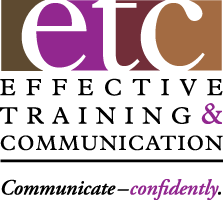When you need to send a message via the medium of the written word – email or hard copy memo – make sure that it’s the best medium for your particular situation, not the first one you thought of or the one you usually think of. First, go through the Workplace Communication Planning Process thoroughly:
Workplace Writing
Give Your Text a Break with Text Breakers
White space makes your emails and other documents easier to read, understand and use. Avoid long paragraphs by breaking them into shorter ones or converting them with Text Breaker numbers, letters or bullets. Also, consider using bold or underlined text for emphasizing keywords. Text Breakers also enable you to eliminate unnecessary words and phrases.
Stop using ASAP!
If you’ve been reading the periodic articles on business writing techniques and strategies found here, you’ve encountered one of my favorite rants – ‘Specific beats Vague’. So, whenever you have a choice between a vague word, like ‘several’ and a specific word like ‘four’, opt for the specific word.
While there’s nothing inherently wrong with using ‘several, your reader assumes you know the real number and wonders why you didn’t use it instead. When you use an undefined word, your readers will define it for you … and likely not the way you would have defined it.
KISS Your Verbosity Goodbye!
Let’s deal with an often unpleasant reality. As business leaders, we spend a lot of each day writing – emails, reports, proposals, marketing materials, evaluations … well, you get the picture. We should all add the title ‘Workplace Writer’ to our business cards.
And we often write more than we need. Those extra – and unnecessary – words waste our time to write them and our readers’ time to read them. They even can get in the way of our messages. What follows, then, is a quick review of ‘Keep It Short & Simple’ techniques to help you KISS your verbosity goodbye – for making every word count and counting every word.
Break More Rules!
Let’s begin the New Year by continuing to look at contemporary grammar as it affects what you write or what you say in the workplace. Here are two more Best Practices for your Workplace Communicator Tool Kits … and we can have some fun discussing them.
Reality Check Your Grammar
How many of you liked learning grammar rules in high school English class and follow those rules consistently today? Not seeing a lot of hands going up … and not surprised. Lots of us still bare those painful scars of Sister Mary Apostrophe wielding that yardstick whenever we even thought of ending a sentence in a preposition.
So, let’s briefly discuss contemporary grammar as it affects what you write in the workplace. To provide that grammar reality check, consider these seven points to help you continue harnessing the power of words … grammatically correct words in this case.
Choose Your Words Wisely!
The words you use in routine workplace writing, interactions and presentations do make a difference. They can impact your results, professionalism and image as a receiver-centric communicator. Or, your words can detract from those results. So, choose your words wisely!
To help you on this journey, enjoy this summary of 12 Best Practices or ‘Recurring Themes’ I typically share in my training or coaching engagements. I don’t ask participants to change any of their word use or style habits. But, I often ask them to challenge those habits themselves in light of what we discuss. If they decide to change any of them, that’s fine. If not, that’s fine, too.
Sexless Writing
Here we go again … trashing more time-honored rules of grammar that may have made sense in your grandparents’ workplaces … but probably not in yours any more. Hope you’re having as much fun as I am getting back at your high school English teachers who beat those rules into you … often with a yard stick. I know I am. So, please allow me one of my favorite WordPower rants – sexist language.
Inaccurate & Insensitive
For generations, this sentence would have been considered perfectly acceptable and appropriate in the workplace, typically in employee handbooks or procedure manuals:
‘The employee should report for work at the beginning of his assigned shift.’
Over thirty years ago, the inequity of that kind of phrase so bothered the leaders of the Women’s Movement, that they got people to do something about it. After all, not all employees were male then and the inference was both inaccurate and insensitive.
And You Can Quote Me!
( My response to a recent LinkedIn Group discussion question that asked about the value of using quotes in presentations.) I regularly use a lot of quotes in my training, speaking and writing. However, I’m adamant about putting the sources in proper context. Few people are so well known that they don’t need any reference, … Read more
Reject Regular Redundancies … Really!
Let’s continue on our journey of challenging your word use habits in workplace communication and business writing. Effective word use is the same, whether the medium of communicating those words is spoken or written. And remember, the responses ‘That’s the first word I thought of’ … or … ‘That’s the one I usually use’ don’t work very well with audience centric messages.
Redundancies Are Laughable
We’ve gotten into some sloppy habits regarding redundancy. While this tendency may not be a major problem in verbal or written communication, it does waste words and the result is often amusing. Unless you’re a comedian, you probably don’t want people chuckling about what you said or wrote.
